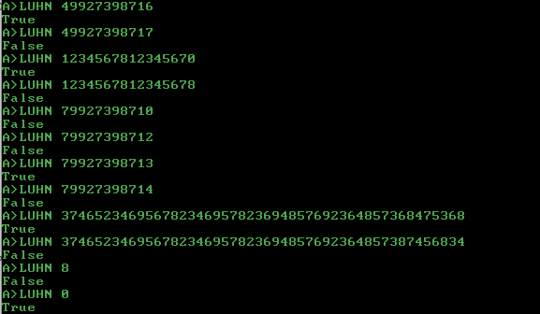54
7
Challenge
Write the shortest program or function to calculate the Luhn Algorithm for verifying (credit card) numbers.
Luhn algorithm explained
From RosettaCode, this algorithm for the purposes of this challenge is specified as such, with the example input of 49927398716:
Reverse the digits, make an array:
6, 1, 7, 8, 9, 3, 7, 2, 9, 9, 4
Double the numbers in odd indexes:
6, 2, 7, 16, 9, 6, 7, 4, 9, 18, 4
Sum the digits in each number:
6, 2, 7, 7, 9, 6, 7, 4, 9, 9, 4
Sum all of the numbers:
6 + 2 + 7 + 7 + 9 + 6 + 7 + 4 + 9 + 9 + 4 = 70
If the sum modulo 10 is 0, then the number is valid:
70 % 10 = 0 => valid
IO Rules
Input: A string or number (your choice), in your language's input/output format of choice
Output: A truthy or falsy value, respectively, indicating whether or not the input is valid according to the test above.
Notes / Tips
Try not to accidentally post your own credit card or account numbers, if you use them to test :)
If the input is invalid and impossible to process with the specified algorithm (i.e, too short to work with), you can do whatever you want, including blow up my computer.
However, the previous bullet does not mean that your language can do whatever it wants with Numbers that are too large for it to handle. If your language isn't capable of handling a test case, then consider taking a string as input.
Examples
The following examples were validated with this Python script; if you think one is wrong or have a question, just ping @cat.
49927398716 True
49927398717 False
1234567812345670 True
1234567812345678 False
79927398710 False
79927398711 False
79927398712 False
79927398713 True
79927398714 False
79927398715 False
79927398716 False
79927398717 False
79927398718 False
79927398719 False
374652346956782346957823694857692364857368475368 True
374652346956782346957823694857692364857387456834 False
8 False **
0 True **
** according to the Python implementation, but you may do anything because these are too short to be eligible by a strict adherence to the specification.
If any of the above invalidates existing answers (though I believe that should not be possible), then those answers are stil valid. However, new answers, in order to be valid, should follow the specification above.
Leaderboard
var QUESTION_ID=22,OVERRIDE_USER=73772;function answersUrl(e){return"https://api.stackexchange.com/2.2/questions/"+QUESTION_ID+"/answers?page="+e+"&pagesize=100&order=desc&sort=creation&site=codegolf&filter="+ANSWER_FILTER}function commentUrl(e,s){return"https://api.stackexchange.com/2.2/answers/"+s.join(";")+"/comments?page="+e+"&pagesize=100&order=desc&sort=creation&site=codegolf&filter="+COMMENT_FILTER}function getAnswers(){jQuery.ajax({url:answersUrl(answer_page++),method:"get",dataType:"jsonp",crossDomain:!0,success:function(e){answers.push.apply(answers,e.items),answers_hash=[],answer_ids=[],e.items.forEach(function(e){e.comments=[];var s=+e.share_link.match(/\d+/);answer_ids.push(s),answers_hash[s]=e}),e.has_more||(more_answers=!1),comment_page=1,getComments()}})}function getComments(){jQuery.ajax({url:commentUrl(comment_page++,answer_ids),method:"get",dataType:"jsonp",crossDomain:!0,success:function(e){e.items.forEach(function(e){e.owner.user_id===OVERRIDE_USER&&answers_hash[e.post_id].comments.push(e)}),e.has_more?getComments():more_answers?getAnswers():process()}})}function getAuthorName(e){return e.owner.display_name}function process(){var e=[];answers.forEach(function(s){var r=s.body;s.comments.forEach(function(e){OVERRIDE_REG.test(e.body)&&(r="<h1>"+e.body.replace(OVERRIDE_REG,"")+"</h1>")});var a=r.match(SCORE_REG);a&&e.push({user:getAuthorName(s),size:+a[2],language:a[1],link:s.share_link})}),e.sort(function(e,s){var r=e.size,a=s.size;return r-a});var s={},r=1,a=null,n=1;e.forEach(function(e){e.size!=a&&(n=r),a=e.size,++r;var t=jQuery("#answer-template").html();t=t.replace("{{PLACE}}",n+".").replace("{{NAME}}",e.user).replace("{{LANGUAGE}}",e.language).replace("{{SIZE}}",e.size).replace("{{LINK}}",e.link),t=jQuery(t),jQuery("#answers").append(t);var o=e.language;/<a/.test(o)&&(o=jQuery(o).text()),s[o]=s[o]||{lang:e.language,user:e.user,size:e.size,link:e.link}});var t=[];for(var o in s)s.hasOwnProperty(o)&&t.push(s[o]);t.sort(function(e,s){return e.lang>s.lang?1:e.lang<s.lang?-1:0});for(var c=0;c<t.length;++c){var i=jQuery("#language-template").html(),o=t[c];i=i.replace("{{LANGUAGE}}",o.lang).replace("{{NAME}}",o.user).replace("{{SIZE}}",o.size).replace("{{LINK}}",o.link),i=jQuery(i),jQuery("#languages").append(i)}}var ANSWER_FILTER="!t)IWYnsLAZle2tQ3KqrVveCRJfxcRLe",COMMENT_FILTER="!)Q2B_A2kjfAiU78X(md6BoYk",answers=[],answers_hash,answer_ids,answer_page=1,more_answers=!0,comment_page;getAnswers();var SCORE_REG=/<h\d>\s*([^\n,]*[^\s,]),.*?(\d+)(?=[^\n\d<>]*(?:<(?:s>[^\n<>]*<\/s>|[^\n<>]+>)[^\n\d<>]*)*<\/h\d>)/,OVERRIDE_REG=/^Override\s*header:\s*/i;body{text-align:left!important}#answer-list,#language-list{padding:10px;width:290px;float:left}table thead{font-weight:700}table td{padding:5px}<script src="https://ajax.googleapis.com/ajax/libs/jquery/2.1.1/jquery.min.js"></script> <link rel="stylesheet" type="text/css" href="//cdn.sstatic.net/codegolf/all.css?v=83c949450c8b"> <div id="answer-list"> <h2>Leaderboard</h2> <table class="answer-list"> <thead> <tr><td></td><td>Author</td><td>Language</td><td>Size</td></tr></thead> <tbody id="answers"> </tbody> </table> </div><div id="language-list"> <h2>Winners by Language</h2> <table class="language-list"> <thead> <tr><td>Language</td><td>User</td><td>Score</td></tr></thead> <tbody id="languages"> </tbody> </table> </div><table style="display: none"> <tbody id="answer-template"> <tr><td>{{PLACE}}</td><td>{{NAME}}</td><td>{{LANGUAGE}}</td><td>{{SIZE}}</td><td><a href="{{LINK}}">Link</a></td></tr></tbody> </table> <table style="display: none"> <tbody id="language-template"> <tr><td>{{LANGUAGE}}</td><td>{{NAME}}</td><td>{{SIZE}}</td><td><a href="{{LINK}}">Link</a></td></tr></tbody> </table>
This seems to return 0 for the example number on wikipedia (49927398716) – gnibbler – 2011-02-01T10:51:16.507
nm. I forgot to use
echo -n– gnibbler – 2011-02-01T11:49:47.3901@gnibbler: Haha, fail. :-P (Seriously, I got stung by that one too, in my initial testing.) – Chris Jester-Young – 2011-02-01T13:06:37.310
1A few places to save a few easy characters here.
-1% 2/can be combined into-2/.1,can be replaced with0(0 is coerced to an array, then+is concatenate).9>9*-can be replaced with9>+(since we're only concerned with the last digit). Also, the checking for odd lengths is a bit long, using.,2%,\+is shorter. After doing this, we can also change{16%}%and(\0=into{16}/(inside the loop). Once you've done all that, it'll look something like this:.,2%,\+-2/0\+{{16%}/2*.9>+++}*10%!. – Nabb – 2011-02-02T17:15:36.033@Nabb: Thanks! I'll incorporate those into my solution, although it looks like you already have one that's kicking serious arse. :-) – Chris Jester-Young – 2011-02-02T17:40:59.273
Yep, Nabb kicked ass on this one – gnibbler – 2011-02-03T22:17:53.260